The treatment of alcohol dependence is possible not only with medication and psychotherapeutic methods. There are many popular recipes that help a person overcome addiction. Most of these medicines are based on herbs.
But despite the apparent harmlessness of plant materials, if used improperly, they can cause harm. That is why it is necessary to know exactly which herbs help against alcoholism and how to use them properly.
Rules for treating herbs
When planning to use an herb for alcoholism, there are some rules to keep in mind:
- herbal treatment should be preceded by cleansing the body of toxins and toxins;
- it is necessary to strictly follow all the doses indicated in the recipe, as the effect of some plants is very strong, while others are usually poisonous;
- is not recommended to replace decoctions and infusions with alcoholic tinctures, this will not add effectiveness to the product and may provoke the breakdown of the alcoholic (in addition, some herbs are completely incompatible with alcohol);
- before starting the course of taking the herbal medicine, you must make sure that the patient does not have an allergic reaction;
- At the slightest sign of poisoning or general deterioration, herbal treatment should be stopped immediately.
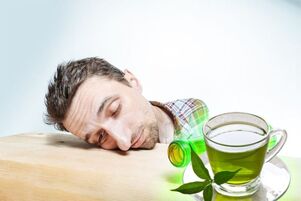
Herbs from alcoholism
There are many herbs that can help you get rid of drinking. Most of them are based on the fact that in combination with alcohol they cause dizziness, nausea and vomiting. A serious condition that reappears again and again after drinking alcohol makes the instinct for self-preservation work. The alcoholic is afraid to drink, expecting to get sick again.
In addition, a reflex is formed - a person sees a direct link between the intake of alcoholic beverages and painful symptoms and on this basis gradually forms a cessation of alcohol.
Thousands of meters
Folk remedies for alcoholism have been very popular for centuries. They were used to alleviate the appetite for alcohol long before the advent of drugs. For treatment, the plant can be boiled alone or as part of a collection. The centaur eliminates the thirst for alcohol, cleanses the body of toxins and normalizes the functioning of internal organs.
To prepare the broth, you need 2 tablespoons fresh or dried centenarian. They are poured with 250 ml of boiling water, boiled over low heat for 10-15 minutes, then insist 2 hours. Strain the broth before use. Take one-third of a glass three times a day. The course of treatment is two weeks.
Puppeteer (Chemeritsa)
Puppet tincture is most often used to secretly treat alcoholism. The herb is very poisonous and in combination with alcohol causes the strongest symptoms of intoxication - lowering blood pressure, vomiting. This is explained by the fact that the alkaloids present in the plant cause disturbances in the activity of the cardiovascular and digestive systems.
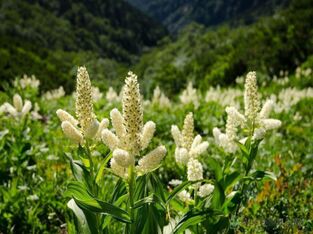
To prepare the tincture, 20 g of raw materials (you can use both the herb and the root) pour 400 ml of vodka and leave for 10 days in a dark place. Then you must carefully strain the liquid. Method of administration: 5 drops of tincture are added to a drink or food for an alcoholic. Treatment continues to a permanent aversion to alcohol.
Important! Using a puppeteer to get rid of alcoholism carries a risk of various complications from severe poisoning to stroke, as the herb has many side effects. Do not use it without consulting your doctor.
Bay leaf
Bay leaf is another working drink. The tincture is prepared from 2-3 large leaves and 200 ml of high quality vodka. The liquid is infused in the dark for 12-15 days, then filtered. The patient is given one third of the resulting infusion once a day. After 3 days, a positive effect is already noticeable - a person has given up alcohol.
Split
The European crack is deservedly considered a very effective means of combating alcoholism. After taking the drug on the background of drinking alcohol, the patient will feel unwell, feel very nauseous and vomiting is possible. For the preparation of a cure for alcoholism is most often used not grass, but the root of a crack.
The tincture of split hooves is prepared as follows: 15 g of chopped rhizomes are poured with a glass of heated water, boiled and immediately removed from the heat. Strain after half an hour. Drink a decoction of 20 ml once a day. It is believed that the cleft gives good results in the treatment of alcoholism in secret by the patient.
Thyme
Thyme (or creeping thyme) is another common drug used in alcoholism. The combination of thyme and alcohol causes abdominal cramps and vomiting, so the patient quickly forms an aversion to alcohol. Moreover, unpleasant symptoms occur when using a product based on thyme, even with a small amount of alcohol.

There are several options for preparing a decoction of thyme from alcoholism.
One of the recipes is as follows: 3 tablespoons of raw materials pour a glass of boiling water and insist for an hour. The filtered liquid should be drunk three times a day with 1 tbsp. The course of treatment is 2 weeks. If necessary, the course can be repeated after a week's rest.
Another recipe for a decoction of thyme from alcoholism is as follows: 3 tablespoons of dried raw materials are poured into 0, 5 liters of water and put on fire. Once the liquid boils, boil it on low heat for about 30 minutes. Then leave in a cool place for an hour. After filtering the broth add warm water to a volume of 0, 5 liters. The product is poured into an alcoholic beverage. For 0, 5 liters of strong alcohol are enough 3 tbsp.
Treatment of alcoholism with thyme gives the best effect in the early stages of the disease, when the addiction is not yet so strong.
Important! When preparing a decoction of thyme, it should be remembered that the combination of this herb with alcohol gives a strong negative reaction, so in the pursuit of a quick result should not exceed the dose.
Lovage
Lovage is a perennial herb of the celery family, quite often used in alcoholism. Such drugs give a quick and fairly stable result due to the fact that in combination with alcoholic beverages they cause unpleasant painful symptoms:
- vomiting, nausea;
- diarrhea;
- abdominal pain.
Pet root is used for alcoholism. 2 tablespoons crushed rhizomes are poured with 250 ml of boiling water and insist for 50-60 minutes. The liquid is then filtered and poured into a glass vessel. Pet tincture is poured directly into alcohol in the amount of 2 tbsp. spoons for 0, 5 liters of drink. The treatment continues until a constant aversion to alcohol is formed.
Kudzu Root
Unlike many herbal remedies that cause aversion to alcohol, kudzu root, which came to us from Asian medicine, works differently. Due to its chemical composition, the plant significantly enhances the effect of alcohol, as a result of which a person achieves intoxication from a much lower dose. Accordingly, less alcohol enters the body, which means that toxins are removed faster and a hangover is easier.
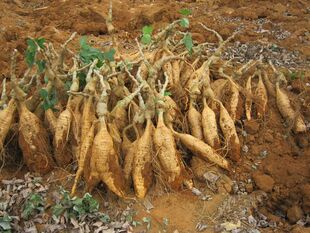
Kudzu root-based products have a cumulative effect and over time the thirst for alcohol weakens and the body begins to recover, thanks to the natural hepatoprotectors and antioxidants contained in the plant.
Curly sorrel
Decoction of curly sorrel helps to improve well-being after overeating, relieve symptoms of intoxication. To prepare the drug 1 tbsp. spoon of crushed root of the plant is boiled with a glass of boiling water and boiled for 5-10 minutes. Then they insist for two hours, filter. It is necessary to drink the infusion three times a day, 60-70 ml.
St. John's wort
St. John's wort contains many natural antidepressants, vitamins and active substances that suppress the desire for alcohol. 2 tablespoons herbs pour a glass of boiling water, then heat for half an hour in a water bath. Drink half a cup of broth twice a day. The duration of the course, depending on the result, is 2-3 weeks.Lamb
Ram is another herb that helps fight alcohol dependence. The effect is achieved within 1-2 months. The infusion of the herb in combination with alcohol causes profuse prolonged vomiting. 5 g of grass is boiled for 5 minutes in 250 ml of water, then infused for 30 minutes, filtered. 50-70 ml of the product is drunk 15-20 minutes before drinking alcohol. In addition, it is advisable not only to drink alcohol, but also to smell it, so that not only the taste but also the smell of the drink cause disgust.
Wormwood
Wormwood infusion will help reduce appetite for alcohol. To prepare it, pour 1 tablespoon of herbs with a glass of boiling water and infuse for 20 minutes. The strained agent is divided into three parts, which should be taken half an hour before meals. The course of treatment is 10-12 days.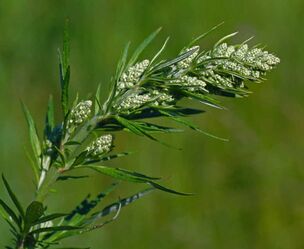 There are many positive reviews about the effectiveness of a decoction of wormwood and thyme. Herbs should be mixed in a ratio of 1: 4, 2 tbsp spoon mixture, pour 0, 5 liters of boiling water. Boil for 10 minutes, then leave for an hour. Once the broth has cooled, strain it. Take 50 ml three times a day. The duration of treatment is 1 month.
There are many positive reviews about the effectiveness of a decoction of wormwood and thyme. Herbs should be mixed in a ratio of 1: 4, 2 tbsp spoon mixture, pour 0, 5 liters of boiling water. Boil for 10 minutes, then leave for an hour. Once the broth has cooled, strain it. Take 50 ml three times a day. The duration of treatment is 1 month.
Herbs from alcohol intoxication
After drinking a lot of alcohol or after leaving the soldering it is necessary to alleviate the condition of the person and eliminate the symptoms of intoxication. There are several proven recipes for traditional medicine for this:
- tansy decoction allows you to reduce almost all the unpleasant signs of poisoning;
- decoction of lemon balm (1 tablespoon per cup of boiling water) helps to stop prolonged vomiting;
- decoctions of horsetail, linden, thyme, mint (1 tablespoon per cup of boiling water) accelerate the removal of toxic substances from the body.
Vomiting herbs can be used to cleanse the body as quickly as possible, but this should be done with caution.
Herbal preparations
Many herbs work well in herbal remedies for alcoholism. Herbal teas not only help to get rid of alcohol dependence, but also relieve stress, stabilize the body, normalize sleep and appetite.
Some popular herbal teas for alcoholism:
- St. John's wort, bitter wormwood, yarrow, thyme, mint, juniper. 1 tablespoon of the herbal mixture is poured with 1 liter of boiling water and insist for 20-25 minutes. The filtered liquid is drunk 3-4 times a day for 15 days. After a week's rest, the course is repeated.
- Monastic tea for alcoholism is another effective drink to relieve the appetite for alcohol. 1 teaspoon of the collection is boiled with a glass of boiling water, infused for 20 minutes, filtered. The product is taken according to the manufacturer's instructions.
- Hoof root coffee is a powerful and quite effective remedy, but should be used infrequently to avoid side effects.
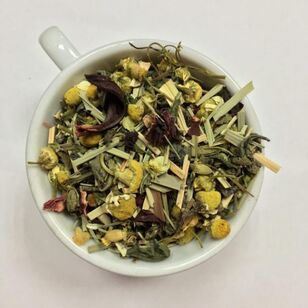
Attention! You can buy herbs for alcoholism fees at the pharmacy or collect them yourself (but only if you are well acquainted with botany and are sure that you have found exactly the plant you need).
Contraindications
Attention! Herbs for alcoholism should not be treated as ordinary tea. We strongly recommend that you consult a doctor before use.
When using herbal medicines, care must be taken and possible contraindications must be kept in mind, the main of which is individual intolerance to any component. There are also a few other restrictions:
- herbs that cause vomiting should not be used for those diagnosed with stomach diseases (gastritis, ulcers);
- in hypertension, herbal medicines can cause complications;
- herbal treatment for alcoholism is also contraindicated in people with diabetes.
Conclusion
Some herbs can actually help reduce the appetite for alcohol. They may not be able to completely cure a person, but as an adjunct they are very effective. If you are going to use folk remedies, you need to make sure that there are no contraindications and strictly follow the recipe and doses prescribed for intake.































